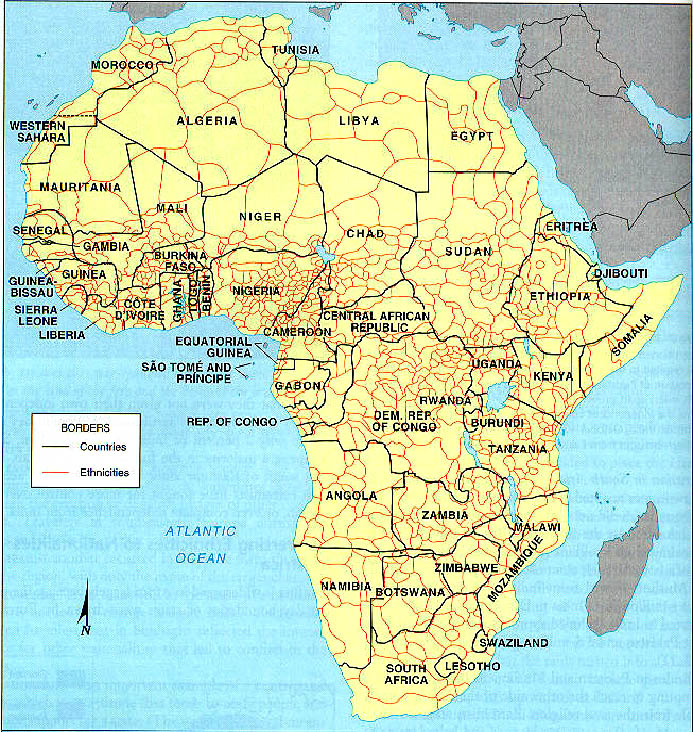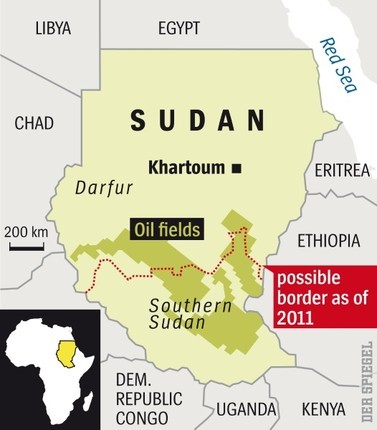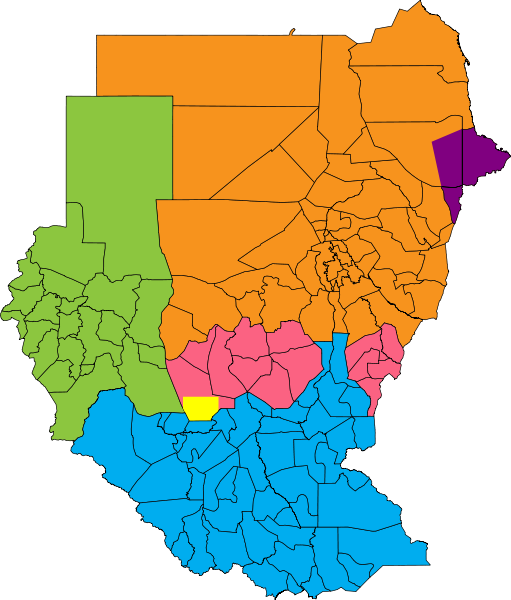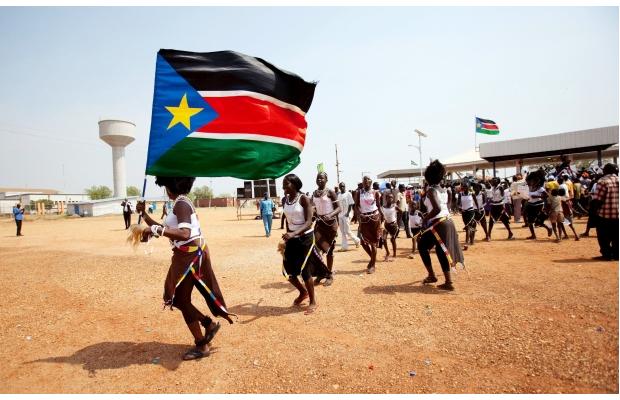After years of sectarian strife including violence in the border regions, the resource-rich south overwhelmingly voted in favor of seceding from the ideologically overbearing and more industrialized north. It may sound as if I’m talking about 1850s and 1860s America, but I am actually describing the modern situation in the African country of Sudan. Seven days ago on January 15, the southern states in Sudan finished a week-long vote in which they voted almost to a man (97-99% in favor in most cases) to secede from Sudan and form their own country.1
The roots of this conflict date back to the era of European colonialism. The Europeans brought with them many great gifts to the African continent: civilization, Christianity, infrastructure, medicine, farming techniques, and so on. But when they divided up the continent amongst themselves, they did so without regard to the ethnic and linguistic groups of the African population. To be fair, this was done unintentionally rather than maliciously; however, this meant that tribes from the same ethnicity woke up one day and found that they were in different countries. This kind of arbitrary drawing of political boundaries is just another example of the stupidity of borders which don’t reflect ethnic realities. To see what this looks like, take a look at the picture below, where the black lines are political borders and the orange lines are ethnic boundaries. They don’t even come close to matching.

After European colonialism ended, it would have made sense to redraw the map so that each ethnicity (or each group of closely-related ethnicities) would have their own country in which they could practice their own culture, speak their own language, and pursue their own self-determination. However, this ditching of artificial and now meaningless political boundaries in favor of real, organic ethnic borders did not happen for two main reasons. First, the petty dictators that took over after the Europeans left had no intention of lessening their own power and ability to become rich by dividing up their holdings. The second and more important reason is that the Western countries propping up these African countries with foreign aid wouldn’t have supported it. The governments and establishments in the West are fully committed to the Marxist doctrine that race and ethnicity are “social constructs” and therefore irrelevant. To admit that ethnic differences were important enough to redraw the African map would have fundamentally weakened their power at home where they were busily promoting the doctrines of diversity and racial egalitarianism.
Since the end of colonialism in Africa, the continent has been a bloodbath. There are a number of reasons this has been occurred: the ruthless and power-hungry character of the men who came to power, the inability of Africans to successfully run a Western-style democracy and society (a culture in which they were never designed to live), the lower average IQ of black Africans, making them more likely to resort to violence, and so forth. However, this list would be markedly incomplete without mention of the ethnic-linguistic-religious basis of many of these wars. Ethnicities who had lived in two, and sometimes three, separate countries for several hundred years wanted independence and self-determination in their own countries. People-groups with longstanding feuds or religious differences which were suppressed with the Europeans in control have flared up again, now that they are forced to share the governance of the same political entity. Remember this the next time some white liberal is wringing his hands about the plight of Africa; he was (and is) willing to sacrifice millions of black African lives by forcing artificial countries to remain intact just to keep his Marxist premise sacred: that ethnicity and race don’t matter.
Keeping all this in mind, let’s move on to the specifics of Sudan. Not only does Sudan have the misfortune of having two dozen or more ethnicities from a half dozen different ethnic groups within its borders and even straddling its borders, but a Muslim-Christian fault line splits the country east to west with a Muslim North and a Christian South. If diversity is our greatest strength, then Sudan should be one of the strongest countries in the world. But of course, diversity plus proximity equals warfare and conflict, not strength or unity. To make matters even worse, Sudan has the third-largest oil resources in sub-Saharan Africa, and these oil deposits straddle the religious and ethnic divides. The dotted red line on the map below is likely going to be the new border between north and south Sudan. The line roughly is the divide between the Muslim, Arabic-speaking Nubians in the north and the Christian and animistic Dinka, Nuer, and Azande (to name the main ones) in the south.

From 1983 to 2005, there was a bloody civil war between the Muslim-controlled government run out of Khartoum in the Arabic-speaking, Muslim-controlled north against the Christians and animists in the south.2 The Sudanese government was also fighting somewhat separate but very related conflicts in the east and west. Fighting was especially brutal in the southern area of Darfur (west Sudan) where the northern area of the oil reserves were within easy reach of the Muslim, government-funded militias. While atrocities were committed by both sides, the Muslims were by far the greater culprits, regularly engaging in genocide, kidnapping, and slave trading as unofficial government policy.3
Largely due to public outcry to end the violence from Western activists and the surrounding African countries, foreign intervention finally brought an uneasy peace in 2005. The peace agreement split the oil revenue between the north and south, gave the south regional autonomy, and called for an independence referendum in six years.4 This is the independence referendum which took place a week ago. I am quite glad that the independence referendum passed with such huge margins. While I think that the area that is going to become a new country should actually become several countries (e.g., the Dinka and Nuer don’t particularly like each other), the vote is certainly a victory for ethnonationalism and a step in the right direction towards peace.

Blue is the area that voted to secede, yellow is contested, pink may join south Sudan later this year, purple and green are the somewhat separate but very related areas of conflict in the east and west, and orange is the Muslim area.
A search for “Sudan” on some of the major American Evangelical Christian news services, such as Christianity Today, Christian Broadcasting Network, and World Magazine, brings up article after article all speaking very positively about the prospect of independence for southern Sudan, accounts of the violence against Christians by the Muslims, and well wishes for the southern Sudanese people. I have no problem with any of this, and I even agree with much of what I read, but imagine the difference in response by these services if this secession vote was about a white-controlled area trying to break off and form a more ethnically-linguistically-religiously homogeneous country. We don’t have to imagine. The slander and hatred heaped upon the Confederacy, the cheering of the NATO bombings of Republika Srpska, and the labeling of groups like Vlaams Belang and Lega Nord as evil white supremacists is more than enough to show that there is a blatant double standard when it comes to most American Christians’ treatment of ethnic self-determination. If you’re African, it’s fine and even laudable, but if you’re European, then it makes you an evil bigot.
I hope one day that Europeans will seek the God-given right to our own countries that the southern Sudanese are pursuing now, but until then, I have some advice for my fellow Christians in south Sudan. Don’t get rid of your AK-47s, don’t allow Muslims in your territory, don’t trust foreign governments, don’t try to set up a Western democracy, and don’t allow any international bankers in your territory to live. The best of luck to you in your independence.

Footnotes
| Tweet |
|
|
|




